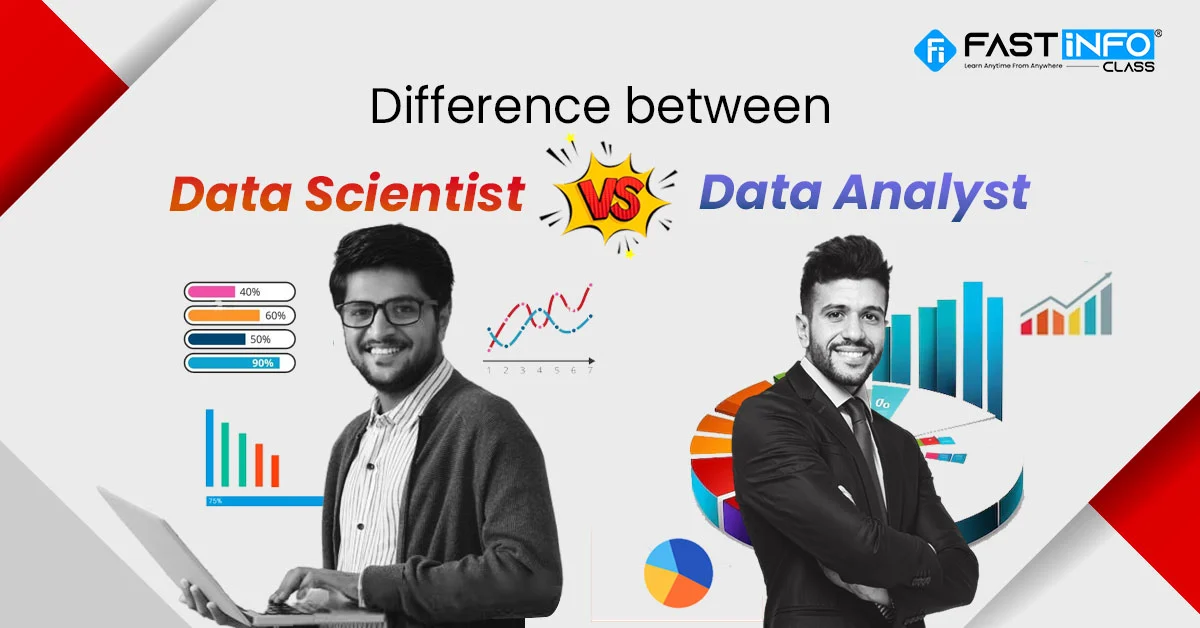Importance of Learning Spoken and Written English
26 Feb, 2025

 By FastInfo Class
Published On 02 Aug 2024
Category Data Science Course
By FastInfo Class
Published On 02 Aug 2024
Category Data Science Course
Data science is one of the buzzwords nowadays among the young generations. They are highly seeking a lucrative job to settle up and lead a passionate life. But there is some confusion in the minds of everybody whether the data scientist or data analyst profession is better. They are very closely related to each other and sound almost similar. Some people mingle with one another but they have some differences. Today’s article will disclose the differences between a data scientist and a data analyst.
Who are data analysts?
A Data Analyst performs intensive analysis to determine the best way to represent it in such a way that it can be easily managed by the managers or authorities. By analyzing the sorted data, they can create KPIs or Key Performance Indicators and define the chart/graph.
Who are data scientists?
Observing closely to data, data scientists collect, classify, and analyze the data. From the received result, they create validate, update, test, establish models and algorithms, and prepare a logical database.
Before dipping into the detailed discussion of data scientist and data analysis, let’s learn about their performing activities.
The role of a data analyst is crucial in any organization, dealing with data. Here are some specific jobs that they do for any organization or business firm.
Data analysts gather information from various un-assorted datasets including various customer data, databases, market research, market demand, and many other segments required for the project.
The data formatting, cleaning, and sorting are the main purposes of a data analyst. They remove unnecessary data and reach close the accurate data removing the inaccuracy. A lot of data may come out during analysis which is not relevant for the specific project. They remove it. This can involve handling a large database by using a data cleaning process so that the accurate data remains on the outcome.
Statistics is one of the vital data processing tools through which an analyst can interpret data patterns. Through the analytical tools, they can bring out positive correlation, negative correlation, no correlation, and many other formats of data. Through this process, forecasting future options in various sectors can nicely interpret the possibilities.
From the assorted data, they create visually representable data through dashboards, graphs, charts, or many other formats. Through this visually representable data, they make informed decisions. Their presentation will be easily understandable by anyone.
Business authorities may ask for different types of data. From the dashboard, graph, or charts, they can show the desired result as per the demands. This might improve the present performance, and future efficiency, reduce cost, and more.
Data analysts must require various tools for performing their actions in analyzing data. SQL, python, R. and various other tools are mandatory tools to accomplish their flawless perfection. Besides, they must access some data visualization tools like PowerBI, Tableau, and more.
They work with the data analysts of various teams of the same organization to get desired data and perfect assumptions. Their collaborative work goes on marketing, production, medical, finance, operation, etc. to understand and serve the data anybody wants. This process may easily predict future prospects.
Data scientists play multiple jobs with any organization’s data beyond analyzing and predicting future prospects. Collecting the data from different sources they analyze and assume future trends by following various algorithms, data-driven outcomes, and creating sophisticated algorithms to handle complex problems. Here is a detailed explanation of the data scientists typically do:
As the data analyst collects data and manages, data scientists collect the data from multiple sources of any organization. They work with a large volume of data and can handle complex datasets encrypted from different sources. From the unstructured data received from other sources, they accumulate and manage them to bring out the expected outcome.
Data scientists use more advanced statistics along with machine learning compared to data analysts. By preparing predictive data models, they predict future trends or automate the processes to observe the algorithm-based further trends.
The data scientists have core responsibilities to develop algorithms from assorted data and form models against them. This algorithm is variable. According to the data change in any field, the algorithms tend to change. These models and algorithms will create data-driven decisions. So, you can avail of recommendations or compact decisions from their research-oriented algorithms.
Data visualization is also a part of data scientists’ activity. Through the collected data whatever complex and interactive it is, data scientists can make it easy. After finding the data from different sources, they establish the complex relationships, and communicating all these findings they make it presentable and understandable to the non-technical data seekers. So, it is the most crucial work for any data scientist.
If you want to get the difference between a data scientist and a data analyst, you have to consider this part of the data scientists’ activities. If it is a production company, they research it. Collecting market data, product information, quality of the product, manufacturing ingredients, and many other data, the data scientist makes a decision, regarding the development and innovation of a product. You will notice that a lot of companies have changed their ingredients to compete with the other products in the market.
By using customized data tools, they develop an automated decision-making system. Then, the machine can decide on your requirements and product improvement purposes. In this way, the data scientists can prepare insight-based products for the wider customers to improve your business.
Data scientists are skilled with top-notch Artificial Intelligence and machine learning. By implementing these two modern-generation technology, they create software-based systems that can perform almost similar to human beings as they are equipped with artificial intelligence. This AI can accomplish the tasks of natural language processing, market forecasting, image recognition, concept image processing, and more.
AI including machine learning can keep communication and stay collaborative with different teams across a business organization. So, it can automatically collect data across the organization related to operations, marketing, sales, down and upsell algorithms, senior management collaboration, and more. By collecting the data from each sales force, AI and machine learning can create insight. Data scientists will work on it and integrate the business organization effectively in this way.
While getting well performing and cracking a lucrative job, you have to study this piece of research-oriented writing. A data science course is applicable for both of them. However, some key differences are available to expertise in both sectors to acquire skills and perform the roles. Here are the key differences highlighted.
Education:
Data Analysts
Educational Degree Required
Data analysts typically require a bachelor’s degree in mathematics, statistics, economics, computer science, and related fields. It is the best option for acquiring the quality that a data analyst should have.
The Courses Recommended
Their course is data science-based analysis requires complete statistics, data management, basic programming skills, excel experience, handling of SQL, and knowledge of programming language is helpful. Python and R are essential for gathering expertise in data science imbibed by data analysts.
Data Scientists
Educational Degree Required:
Data scientists must have an advanced degree in data science. The more technical course you would pursue, it would be best for you to reach the top of the data science course. It is more on research-oriented service. The field of study is almost similar to data analysis but here you have to dive into the deeper study with research on data science, engineering, and computer engineering.
The relevant courses they require
The data science course courses they must pursue should include advanced statistics, programming, machine learning, data management, and artificial intelligence with machine learning. They must acquire proficiency in programming languages (Python, R, etc.), and advanced level machine learning with algorithms, and big data technologies (Spark, Hadoop), is expected.
Work Opportunity:
Data Analysts:
Entry level- After completing a great data science course, most career-conscious candidates can crack a job in companies. An entry-level job is directed to focus on data cleaning, statistical analysis, data processing, sorting, etc.
Skill Development- Along with basic or entry-level data analysis, they have to take add-on responsibilities in the field of complex data analysis, creating data models, additional data visualization, and presentation through PowerBI, and Tableau.
Data Scientists:
Advanced start- Data scientists are previously experienced or studied various topics before the training. They are experienced in solving issues on statistics, education, programming, computers, and machine learning. So, they can start their job from an advanced level with a higher CTC. When they take advanced data science courses, they can easily handle large data profiles for an entire organization manufacturing unit, or production unit where a huge database is generated every day.
Career progress- As soon as they are habituated to handling greater data, they will be capable of developing new strategies, project methodology, data sorting algorithms according to demand, and more. Data science is a vast subject where continuous learning and keeping one up-to-date is the way to acquire higher success. Machine learning and AI advancement would be the milestones of their career progression.
Data Analyst vs. Data Scientist: Know the Responsibilities
At the time of discussing the difference between a data scientist and a data analyst, it is important to know the roles and responsibilities of both. It is clear that they both work with data but in a slightly different way. Their task completion scope, handling complexity, and objectives are a bit different. So, their roles and responsibilities in the work field are distinct.
Data Analysts
Data accumulation and preparation- After collecting the data from a wide source of any organization or company, they process, clean, and assort data to find accurate data to access maximum reliability. Their primary data handling is from structured data.
Routine analysis is the prime duty of the data analysts. Accumulating and collecting the data from different necessary sources, they provide statistical data and grab the trend of the market. They analyze the market and assume the future of the present business through the results within the data.
Data visualization is also a duty of all data analysts. Through PowerBI, Tableau, and Excel, they create attractive dashboards and data-accessing solutions through which a non-technical person can understand what is happening with the project, company, or business. They can get the accessed data report easily.
The focus of all data analytical experts is to get descriptive analytics. Through the history of the data and the present status of the business, the analytical experts find the best descriptive data that works.
Through the statistics analysis, they can bring out the results of correlations. It might be positive, negative, or no-correlation data charts and some of its variants. Thus, a businessperson can determine the future prospects of his business and can make decisions about the next step of the business.
Data Scientists
Advanced data collection and management- Collecting data from structured and unstructured sources, they bring out the expected result and descriptive data with perfect correlations.
By using advanced mechanisms and applications with customized data programming, they run machine learning algorithms to justify the statistical methods to create predictive models that help get a forecast of the outcome of the project from the previous and present data and guess the future aspects. Thus they create predictive data modeling.
Data scientists create different algorithms for AI and machine learning. They generate humanlike precision and data processing to get maximum potential outcomes and help generate new products or services.
The prediction is uncertain. Still, the data scientists analyze different types of data collected from sources. Then, they use their data science skills and make the decision to achieve the desired outcome.
If any company has multiple branches or departments, the data scientists can participate in cross-functional data collection and analyze them to determine the progressive development of each part of the department as well as the company’s total growth.
Research and innovation are the two fundamentals of data scientists. Through the research, they can explore new methodologies and thus they bring out the maximum outcome for the company with superior analytical capabilities.
Therefore, you received the comparison analysis that shows the difference between a data scientist and a data analyst. Now, you can choose one of the courses according to your capabilities. These courses will build your career and make you fit for the global job field in data science. You can pursue the Data Science course at FastInfo Class, the best across the nation. Contact them now.

Importance of Learning Spoken and Written English
26 Feb, 2025

Smart English Conversation Tips for Beginners
26 Feb, 2025

How to Learn English Fast: 10 Effective Tips
14 Feb, 2025

What is the Importance of English in Corporates?
13 Feb, 2025

How to Improve English Listening Skills: 12 Tips
13 Feb, 2025

Daily English Conversation Practice for Beginners: 50 Useful Topics
29 Jun, 2023

Must Read Novels to Improve English for Beginners to Advanced
21 Feb, 2023

Top 15 Spoken English Books to Enhance Your Fluency
09 Sep, 2023

English Speaking Course for Beginners - Everything you must know
22 Sep, 2021
.webp)
What are the Benefits of Speaking English Fluently?
27 May, 2021